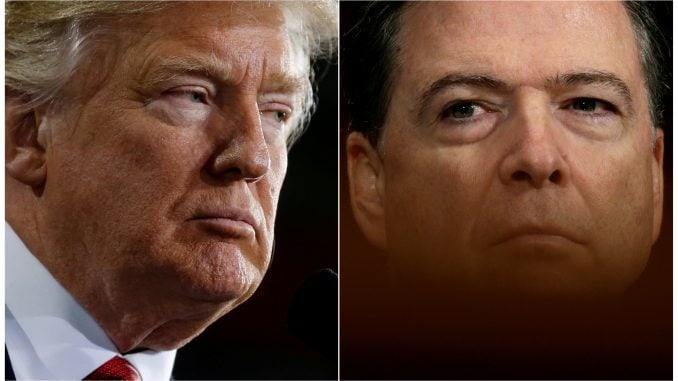
If privilege is the power to define your reality, Donald Trump the mogul had a triple scoop. He was the boss of his own company and the star of his own television show. He flew wherever he wanted on a private plane.Privilege has a different meaning now that Trump is president and especially now that he is a president whose administration is under investigation by special counsel Robert Mueller.Rather than the padding of power and wealth, privilege for the president is a legalism that, according to experts, does not provide as much protection as Trump seems to believe.Former FBI director James Comey confirmed in testimony before the Senate Intelligence Committee that he memorialized his meetings with the president, including a private dinner during which, according to Comey, Trump asked him to pledge his loyalty and another conversation in which the president allegedly asked Comey to drop the FBI’s investigation of former Trump national security adviser Michael Flynn.Comey says he was so concerned about Trump’s public account of their interactions that he authorized a friend to disclose the existence and content of his memos to reporters.In a written response to Comey’s testimony, Trump’s personal lawyer, Marc Kasowitz, disputed Comey’s account of the conversations and the former FBI director’s right to disclose those communications.Those meetings were privileged, the Kasowitz statement said. Comey, Kasowitz said, appeared to have an “entirely retaliatory” motive “for this unauthorized disclosure of privileged information.”According to a Reuters report, Trump’s lawyer plans to file a complaint at the Justice Department and a submission to the Senate about Comey’s disclosure of conversations with the president. The Trump team’s insistence that Comey violated the president’s privilege raises the question of exactly what privilege may have shielded Trump’s discussions with the FBI director.Comey was not acting as the president’s attorney in their conversations, so Comey is not bound by attorney-client privilege. Law professor Jonathan Turley of George Washington University argues that Comey violated FBI regulations governing the unauthorized disclosure of investigative material.”Any way you look at it, this is FBI information,” Turley said, and Comey arranged for it to become public. “What he was describing is a grossly unethical act,” Turley said.But even if the former director improperly disclosed investigative details, his violation would involve privilege belonging to the FBI or the Justice Department, not to Trump.The only Trump-owned privilege that could reasonably apply to Comey’s conversations with the president is the executive privilege for presidential communications. And executive privilege does not grant the president a right to cloak all of his conversations in secrecy if it did, there wouldn’t be bookshelves full of the memoirs of ex presidential advisers.The U.S. Supreme Court said in 1974’s U.S. v. Nixon that the privilege for presidential communications is qualified.The justices held the privilege can be overcome, for instance, when the communications are evidence in a criminal investigation, as they were when a special prosecutor subpoenaed President Richard Nixon’s audiotapes. Comey testified Thursday that his records of conversations with Trump are now in the hands of special counsel Mueller.President Trump almost certainly waived his right to assert executive privilege over his Comey conversations if not when he disclosed details of those conversations in tweets and interviews then when the White House did not invoke the privilege to block Comey from testifying.The president subsequently disclosed details about his conversations with the former FBI director in in Comey’s termination letter, in tweets, and most notably, in an interview with Lester Holt of NBC.But is Comey a leaker? Comey’s admission that he asked a friend to disclose the content of one of his memos in order to provoke the appointment of a special counsel leaves him open to that accusation.Law professor Stephen Vladeck of the University of Texas, said Comey didn’t break the two laws most often used to prosecute government leakers the Espionage Act and the federal conversion-of-property statute because he didn’t disclose classified information relating to the national defense or information that could have pecuniary value.Even Vladeck, however, said he believes the former FBI director should not have orchestrated the public disclosure of his memo. “It was wrong, just not illegal,” Vladeck told me. Trump, Kasowitz and their allies, in other words, have plenty of ammunition to use against Comey. But let’s dispense with the idea that the president was entitled to privilege when he talked to the FBI director.Alison Frankel is a columnist for Reuters.



